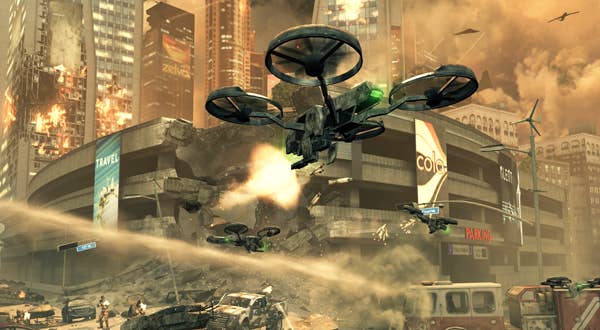Games retail in decline: Can industry recover this holiday?
The holiday got off to a miserable start in October in the US. Analysts discuss the all-important Q4
US games sales, according to The NPD Group's retail data, were down 25 percent in October - not exactly the strong start you'd like to see for the hugely important fourth quarter, when the industry typically generates a bulk of its annual revenues. Sales were even down sequentially from September by about $100 million. It prompted Macquarie Securities' Ben Schachter to question the importance of this year's holiday shopping season. "At this point, beyond a limited number of major releases, the holiday game season does not look like a major catalyst for the industry in aggregate," he said.
Does this mean that buying patterns are changing and that the holiday season is no longer that important? Has digital, which represents roughly half of revenues, lessened Q4's relevance? Or does the industry simply need a wave of new consoles to spur sales?
Interestingly, Nintendo's part in all of this is actually quite critical. A lot is weighing on the launch of the Wii U a week from now.
"Nintendo is the wild card that will determine whether the holiday season is viewed in retrospect as one of 'treading water' or one of sharp decline"
Lewis Ward
"I suspect that this holiday season will see relatively weak overall spending totals in the US. The reality is that sales of Xbox 360 and PS3 physical products this holiday season will probably be off 10 percent to 20 percent compared to last year, a noticeable but manageable decline," commented IDC Research manager Lewis Ward. "Nintendo is the wild card that will determine whether the holiday season is viewed in retrospect as one of 'treading water' or one of sharp decline."
"Most of the drop off in aggregate retail sales in the US in 2012 was the result of weak Wii hardware and disc sales - the HD platforms held up okay. If the Wii U storms out of the gate it will lift the video game industry back into 'treading water' mode - and allow Nintendo to breathe a giant sigh of relief. If Wii U doesn't preform well, total industry sales could be down 20 percent even once digital console game sales are taken into account. The holiday season will always be critical for gaming. In the past decade I don't think there's been a single year where at least 40 percent of all dollars spent on consoles hasn't been in the fourth calendar quarter and 2012 shouldn't be any different."

NPD's own industry analyst, Anita Frazier, chimed in to stress that what we're seeing at retail now isn't highly unusual. In fact, even the drop-off from September to October has been a regular pattern.
"Since 2006, only one October ('08) has outsold September (the month prior). In '09, the delta was also about $100MM. In '07, September was about $150MM higher than October. Lately, we've had Madden hit September which contributes to the last couple of years," she explained.
"I think the root of what we're seeing with retail game sales lies with the age of the console lifecycle as well as the more limited (notably more limited) amount of new content being introduced to the retail market, which is having an impact on not only launch month sales, but on catalog sales down the line too since this has been happening for a number of months."
Indeed, the length of this console cycle is certainly playing into the sales problem.
"We are late in a console cycle and 71 percent of new console purchases are done by consumers who are either replacing a broken console or are purchase a competing console--turning them into multi-console homes. In either case, these consumers are already part of the ecosystem, so their contribution is minimal. Those that are buying their first console, so late in the cycle, are generally extremely price sensitive and contribute little to software and digital sales," EEDAR's Jesse Divnich told us.
"The best way to describe this holiday season is 'status quo'. The holiday season is incredibly crucial to interactive entertainment, and its importance is just as much now as it has ever been," he stressed. "Who it is important for, however, is relative and depends on where we are at in the cycle. Early in a cycle, the holiday season is crucial for new IPs and new hardware, but as we progress and get deeper into the cycle, the importance shifts to established brands. Just because we are viewing the 2012 holiday season as 'boring', it is far from being considered unimportant."
RW Baird analyst Colin Sebastian agrees. "I think the traditional video game industry is showing the same trend as it has the past two years," he said. "There are only a limited number of high quality, recognizable franchises that sell well, and everything else is basically underperforming. This is not a new trend. The reasons for this are multiple, but the console business won't really get a shot in the arm until new hardware is released next fall."
"Gamer spending is shifting to pre-owned console software and to digitally distributed console game add-ons and PC games"
Billy Pidgeon
Of course, it's also important to recognize the big impact of a much-weakened economy. Billy Pidgeon, senior analyst at Inside Network, remarked, "The significant declines in revenue from packaged software are due to a combination of factors, including a sluggish economy. The current console cycle is far longer than previous cycles, so hardware is fairly saturated. This is slowing sales of new packaged console software, while gamer spending is shifting to pre-owned console software and to digitally distributed console game add-ons and PC games."
"I do expect increasing revenue from November into the new year with releases of strong titles like Halo 4 and Call of Duty: Black Ops II. Also, the Wii U launch will bring in stronger hardware and software revenue."
So what do the months ahead actually look like? Wedbush Securities' Michael Pachter believes "there is finally light at the end of this almost four-year tunnel of declining video game sales." He continued, "We believe that good games will continue to sell well, and November is off to a solid start with successful launches of Assassin's Creed III and Halo 4."
That said, he doesn't believe Wii U software sales can offset expected sharp declines in year-over-year Wii software sales. Ultimately, November, December and January software sales should "moderate at close to flat, with slightly negative sales likely," he said. The big jump should come in February. "We expect results to rebound into sharply positive territory in February, when Take-Two releases BioShock Infinite, and we don't think that results will revert to double-digit negative sales growth again in 2013," Pachter noted. It's still going to be a bumpy ride, however, until 2014.
"We think that the industry is positioned for a rebound in 2014. Until then, there will be occasional huge months (from the release of games like Grand Theft Auto V, for example), and occasional modest months," he said.









